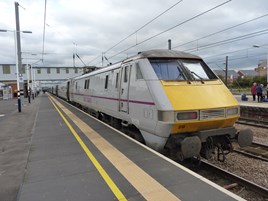Former train operator and top Railtrack/Network Rail executive MICHAEL HOLDEN explains why he believes a fully public railway won’t work, drawing on his experience as chairman of the Government-run East Coast service
The leaking of the Labour party election manifesto may or may not have been deliberate. But the intent to reverse decades of market liberalisation of both the physical assets and service delivery of key elements of our great national infrastructure is clear.
But while energy, telecoms, mail and water are now clearly seen as being owned and operated in the private sector, for the rail sector we have a situation which is far less clear, and even less widely understood.
First, let’s address the biggest misunderstanding: lots of people think that our overground railways are privatised. That’s not really the case at all.
Sure, the trains are owned by private sector companies which lease them to train operators, but those train operators are nearly all running franchises or concessions which have been let by arms of either central or devolved government.
These franchises and concessions may be for different lengths, and may or may not require the operators to carry revenue risk as well as cost risk, and may or may not prescribe the rolling stock for the operators to use. But the key point is that the franchise or concession-letting organisations - be they the Department for Transport, Transport for London, Transport Scotland, Merseytravel, Nexus or whoever - are letting contracts in order for the private sector to deliver a public service on their behalf. So we can see that the private sector operator is merely holding the rights to deliver a defined specification to a defined level of quality for a specific period of time.
This process extends to the types of train that are ordered and operated. In recent years, these have increasingly either been specified as franchise requirements or else bought directly by the Government and then handed to the franchise winner.
Effectively, the impact of all this is to make the operators behave like contractors, and to make the letting authorities behave like clients. This means that while the delivery of service is in the private sector, the service itself is not privatised as it is being specified publicly.
Take fares and ticketing as an example. Operators are widely lambasted for expensive and inflexible fares, old-fashioned and over-complex ticketing systems, and a general seeming lack of desire to move with the times and respond to customer needs.
All of this is probably true, at least up to a point. But the principal architecture of the national fares and ticketing system is under the direct control of the DfT, where it has sat since the railways were restructured in 1994, apart from a brief spell when this responsibility was transferred to the Strategic Rail Authority during its short life. Yes, operators are allowed to set so-called ‘unregulated fares’ and to develop new ticket types, but these are constrained within the limitations of the wider system.
In the 23 years since 1994, the internet has come of age. Operators have enthusiastically taken up the opportunities this has created as a way of driving demand and yield growth, but all built upon the original fares system inherited from the British Rail era. Hence fares have become more complex and more variable as the years have passed. Those with unregulated Anytime fares have been encouraged to price up to what the market can bear, in order to maximise their revenue… and they need to maximise their revenue in order to pay the level of premium that they originally bid to win the franchise in the first place.
Fares and ticketing is a complicated subject (and probably worth another article in its own right), but I hope this gives enough of a flavour for us to be able to see what is really going on here: that is, that the complexity and variability of the fares system today is a product of the system specified and driven by central government. This is wholly a public sector responsibility, and has not been properly overhauled over the last 23 years, during which time so much has changed around it.
This is a failure of policy, not execution. Ownership of the various elements of the system is much less important than the need for the directing mind (in this case the DfT) to determine a vision for the future of fares and ticketing, and to then set policies to enable the vision to be realised.
So far, I’ve only looked at the trains themselves and the operators who run them. But what about the track and stations on which they run?
Nearly all overground rail infrastructure in Great Britain is owned by Network Rail, and most of it (excluding most stations) is managed by it, too. Network Rail has internalised most of its track maintenance, and some of its renewals activity.
Yet Network Rail is fundamentally a public sector business, and has been ever since the Office for National Statistics determined in December 2013 that it should be treated as such. The importance of this decision was much overlooked at the time. I remember Sir Patrick McLoughlin, who was the Secretary of State for Transport at the time, saying to me on the day that the decision was announced that he felt it was largely an accounting issue, and should not have any significant impact. I told him straightaway that I thought it was a colossally significant decision which would have major repercussions down the line. Even today, these are still only just becoming apparent.
The immediate impact has been to bring Network Rail under much closer governmental control than either it or its predecessor (Railtrack) ever was. Ministers are able to instruct the chief executive of Network Rail directly, and do so frequently - either explicitly or else implicitly through nods and winks.
The whole regulatory framework put in place by the Railways Act 1993, and its subsequent amending pieces of legislation, is still technically in place, but the Office of Rail and Road (ORR) has been left with a much-diminished role. It is not yet clear how well the concept of a five-year financial framework with high-level objectives agreed in advance, and handed to Network Rail to deliver with regulatory review by ORR, will survive its first encounter with the real world of politics and the all-too-obvious need to control Network Rail’s spending on enhancements.
If I was trying to predict what the next five-year regulatory cycle will look like, I think it might look something like this: the Statement Of Funds Available will be for a reduced overall total; the list of enhancement schemes will be shorter and less explicit than before; there will be a renewed emphasis on value for money in the renewals and enhancements areas; and a focus on benchmarking through a much more regionalised approach to regulating Network Rail’s activities.
If you have been following my line of thought so far, you will have come to appreciate that the argument about whether our railways should be nationalised or privatised is a sterile one - they are effectively nationalised already in all but name.
However, what tends to exercise the minds of left-leaning politicians and the wider public at large is those pesky franchises. Why should private companies be brought in to operate public service contracts, and make a profit on these that is then removed from the industry and paid to shareholders?














Comment as guest
Comments
Melvyn - 26/09/2017 18:35
Network Rail might now be classified as a public body but the reality is it's more centrally controlled from the centre by the DFT than British Rail was in its day when it was left to get on with the job of providing a rail service. Admittedly it's funds were not guaranteed and were on a year to year basis making long term planning much more difficult but in the days of falling demand this was not as great a problem. As for the Franchise model well in recent years their have been fewer and fewer bids for franchises with even the profitable SWT franchise only attracting one other bidder to the then incumbent franchisee . And given a number of franchises are held by fellow EU state owned railways their future post Brexit can't yet be guaranteed. Of course the creation of London Overground controlled by TFL and other regional bodies like Transport for the North , Merseyrail and Greater Manchester brings changes to the way and structures Rail operates with possibilities like Stations being transferred to the bodies who can plan longer term than 5-7 year franchises allow together with combined local planning. As for trains well the Highways Agency doesn't own the vehicles that use motorways so why can't Rail be similar with ownership of rolling stock with some privately owned and some like Overground or Merseyside publicly owned ! It's not 1948 yet that's the mindset media holds when questions about state railways is raised .
Reply as guest
Richard Hunt - 26/09/2017 20:52
Mr Holden, you make some points which are very instructive and which I haven't considered before. Particularly, as Mark Smith said on Twitter, re pricing. However, overall you end up concluding that the British franchising system should be maintained. So here is my question to you. When I compare Germany's railways to the UK's at this time, as a customer I find the German one superior on every parameter that matters to me (I am not a German taxpayer, but I never heard any German taxpayers arguing for mass privatisation). Do you disagree? Can you point me to any signficant customer benefits where the UK is ahead? If not, and we agree the German system seems to work better, what implications does that have for the discussion about improving UK railways?
Reply as guest
Chris - 06/10/2017 12:55
Mr Holden is biast as he simply has his finger well & truly in the privatised pie and has vested interests!
Reply as guest
Alan - 20/02/2018 09:48
DB runs approximately three times the net state subsidy and around one third the investment (extension, upgrade & major planned maintenance) budget. They've also had far more consistent levels of use over the last few decades; which is a mixed blessing in many respects but an easier situation for the industry to manage. The argument surrounding fares vs. customer experience boil down almost entirely to that; how much do you the taxpayer want to pay? All the European internation cost-value comparisons of the last two decades bear this out; the UK is cost-per-mile competative (overstaffs various functions and pays too much for certain classes of staff but claws its way back via other efficiencies...) we simply choose to place the cost upon the passenger.
Reply as guest
Jonathan Collins - 14/11/2018 12:09
What the author fails to mention is the disjointed nature of the existing national network, and how privatisation doesn't address this issue, as it doesn't care for social mobility and inter-regional connectivity. While they may be best placed to run their own individual services, there are still some massive anomalies in the network that simply wouldn't exist in a more efficient country, such as Germany. Take Merseyrail and Northern. Two different TOCs with two different networks. Merseyrail trains must terminate at Ormskirk and Kirkby, because the trains are simply incompatible with the diesel lines that run on to Preston and Wigan respectively. The disjointed nature of this anomaly simply doesn't have a care in the world for the people of this sub-region. It is not only inefficient, but also stifles connectivity. The Norther services that run on to Preston and Wigan are infrequent, unreliable and antiquated. It is not in the interests of privatisation to consider these issues as each TOC is only concerned about itself and its existing customers. The thought of merging/improving connectivity is almost an alien concept, thus the only way these issues can be addressed and fixed is to look at the network holistically, and the only way this can happen is for renationalisation. The current network cannot, and will not, ever be able to move on and sow these lines together (as well creating new ones). The ultimate loser is the general public. Be they rail passengers or not. A disjointed, broken rail network only serves to persist in disgruntling loyal rail passengers (high fares, cancellations, etc), whilst deterring potential passengers who otherwise generally use a different mode of travel.
Reply as guest
Judas Priest - 27/09/2017 22:43
Mr Holden, you currently head an organisation called Coledale consulting which isi describes as a “Railway management consultancy specialising in strategic advice to railway companies”. This seems to imply that you profit from the current franchise system. How odd that you should propose an argument that would keep your business in the money? No doubt a complete coincidence.
Reply as guest
AndrewJGwilt1989 - 29/09/2017 00:08
Its likely that First Group, MTR, Abellio, Govia/Go-Ahead, Arriva and/or Trenitalia that could be bidding on taking over the East Coast franchise if Virgin Trains/Stagecoach loses the EC franchise to one of the preferred bidders. First Group are also willing to take over the West Coast franchise that Virgin Trains/Stagecoach could also lose as well. I think First Group are likely to win the franchise to take over the West Coast franchise.
Reply as guest
Andy Hales - 30/09/2017 10:15
At privatisation BR had 700m passengers, £2bn subsidy. Now 1.7bn passengers, need £5bn subsidy. Great we have more passengers but that is more in spite of privatisation than because of. Since 95/96 we have seen big changes in peoples movement as we become more global as low cost air lines show. The railways run 20% more trains but take over £15bn in revenue against less than £5bn in 1996, including subsidy. This shows the waste of privatisation.
Reply as guest
J gardner - 04/10/2017 17:45
Send a copy of this articule to all MP's.
Reply as guest